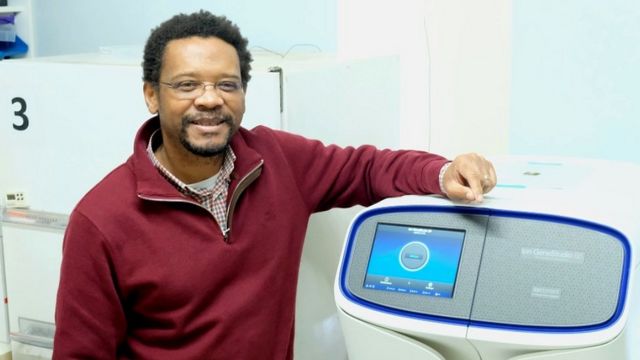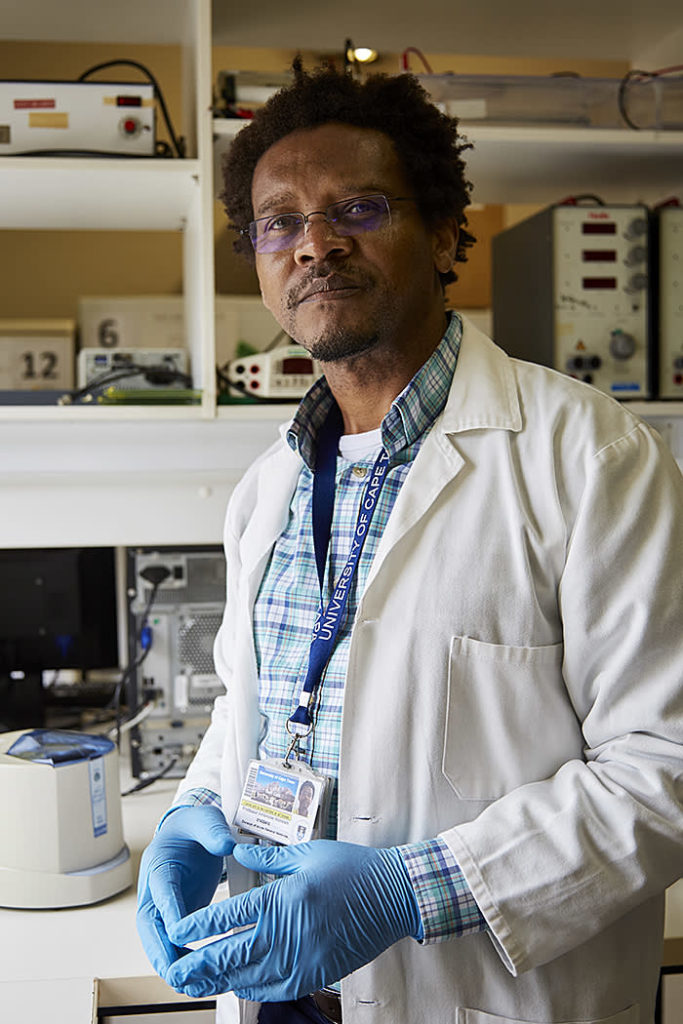South African geneticist, of Cameroonian origin, Ambroise Wonkam, M.D., Ph.D., D.Med.Sc., has been selected as Johns Hopkins Medicine’s director of the Department of Genetic Medicine and the McKusick-Nathans Institute of Genetic Medicine. He leads the department since January 1, succeeding David Valle, M.D., who will remain on the Johns Hopkins faculty and continue research and clinical duties.
Established in 2019, the Johns Hopkins Department of Genetic Medicine is one of 32 departments at the Johns Hopkins University School of Medicine. Previously, genetic medicine was centralized at the McKusick-Nathans Institute of Genetic Medicine, which was formed in 1999 and named for genetics pioneer Victor McKusick and molecular biologist Daniel Nathans.
Ambroise Wonkam will oversee nearly 40 faculty members who are primary appointees in the Department of Genetic Medicine. The department also includes genetic counselors, nutritionists, nurses and physician assistants who work with faculty to provide diagnostic, management and counseling services for pediatric and adult inpatients at The Johns Hopkins Hospital as well as at nine outpatient clinics.

Each year, faculty and clinical staff in the Department of Genetic Medicine see approximately 4,000 pediatric and adult patients with genetic conditions of the cardiovascular and connective tissue systems and other conditions including inborn errors of metabolism, mitochondrial disorders, malformation syndromes, skeletal dysplasias, intellectual disabilities and neurodegenerative diseases.
With approximately $35 million per year from federal and other funding sources, the department’s scientists study genetic and genomic aspects of all disease, from rare single gene (Mendelian) disorders to common complex traits. The department has trained more than 1,000 medical and graduate students, residents and practitioners.
Pivotal contributions to research on sickle cell disease
An advocate of diversifying the pool of genetic reference data that scientists often use to make genetic discoveries, Ambroise Wonkam has made pivotal contributions to research on sickle cell disease, hearing loss, medical research ethics and genetics education.

Ambroise Wonkam received his medical degree from the University of Yaounde in Cameroon, a doctorate as well as specialist training in medical genetics from the University of Geneva in Switzerland, and a doctorate in human genetics from the University of Cape Town in South Africa.
He remained at the University of Cape Town and soon became a professor of medical genetics, then deputy dean of research and director of GeneMAP (Genetic Medicine of African Populations), an effort to increase representation of the genetic diversity of Africa’s populations in genetic reference genomes.
Ambroise Wonkam has authored more than 180 peer-reviewed research publications and leads numerous grants from the National Institutes of Health. His research has included a focus on the psychosocial aspects of sickle cell disease and genetic links to the condition’s symptoms.
The Sickle Africa Data Coordinating Centre
Recently, Ambroise Wonkam established the Sickle Africa Data Coordinating Centre to study how epidemiological, clinical and genetic information from African populations with sickle cell disease may correlate with treatment outcomes. Growing up in Cameroon, Wonkam watched his friends and classmates endure the toll of sickle cell disease, a heritable condition of sickle shape red blood cells that is marked by intense pain, disability and shortened lifespan. The experience spurred Wonkam’s interest in genetic medicine. “To make genetic medicine a global good for understanding the variability among us, we need to understand our genome to its fullest. We have a duty to carry forward this work and make genetic medicine innovations sustainable and equitable for all populations”, says Ambroise Wonkam.

In his research on hearing loss, Ambroise Wonkam has been working on genetic sequencing studies to find new types of genetic variation that lead to hearing deficits. His work revealed that three genes long linked to deafness have no major role among most African populations, making routine testing in these populations unnecessary and less helpful in diagnostic practices.
Increasing the number of African people represented in human reference genomes
Ambroise Wonkam has long advocated increasing the number of African people represented in human reference genomes that provide a baseline comparison for many scientists performing genomewide association studies. The genomes, Wonkam notes in a recent Nature commentary, are missing huge amounts of data that represent the genetic diversity and variation of African populations. At stake, he says, is the ability to develop treatments and diagnostics that work equitably in all populations.

Ambroise Wonkam is an associate editor of The American Journal of Human Genetics, the American Journal of Medical Genetics and the Journal of Community Genetics, an academic editor of PLOS One and a member of the Human Genetics editorial board.
This year, Ambroise Wonkam won the Alan Pifer Award from the University of Cape Town. He has also received the Clinical Genetics Society International Award from the British Society for Genetic Medicine. He is the current president of the African Society of Human Genetics.



